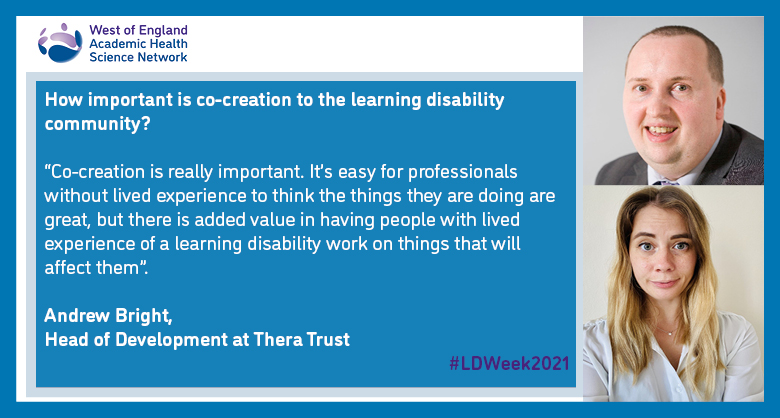
So, what is co-creation? Co-creation is when an organisation or team work with a group of people to create something, particularly when that group will be affected by the outcome, or use the resource or service being created. For example, the NHS might work with a group of people with lived experience, in this case people with a learning disability, to design a leaflet to help others in the learning disabilities community to make healthy food choices.
The West of England Learning Disabilities Collaborative puts people with a learning disability at the centre of everything we do, and that includes involving them in anything we create to support the learning disabilities community. In the past our valued experts-by-experience have worked with us to make online training and meetings more accessible, to prepare for webinars, and to create videos for carers, healthcare professionals, and people with a learning disability. We always strive to ‘work with, not do to’ the learning disabilities community.
Andrew Bright, Head of Development at Thera Trust, is a person with lived experience of a learning disability. Andrew works closely with the collaborative on several projects. To mark Learning Disability Week 2021, Louise George, Senior Project Manager at the West of England AHSN caught up with Andrew to discuss his experiences of co-creation, and working with the collaborative…
Andrew, how would you explain how important co-creation is to others in the learning disability community?
I think co-creation is really important. It is easy for professionals without lived experience to think the things they are doing are great, but there is added value in having people with lived experience of a learning disability work on things that will affect them.
I enjoyed working with the collaborative on creating training and a series of videos for carers, and it was great to be involved in something that was so important nationally.
Do you think people and organisations do enough to involve people with a learning disability in designing the services and resources they use?
People are making a start, but they are still not involving people with lived experience as much as they could. People need to do more, as many self-advocates would jump at the chance to work with the NHS to make things better.
I feel that the work I was involved in creating the video series and training for carers sets an example of successful co-creation.
How has your experience of working with the West of England Learning Disabilities Collaborative been so far?
We are still at the start of learning how to work together, but I have really enjoyed it so far. Using Teams instead of emails allows us to have more of a conversation, and work through things we are working on together. The only thing I would like is more advance notice of deadlines; however I know this is not always possible, and I am not put off by this.
I feel that the people are easy to talk to and that my contributions are valued.
What would you like people to know if they are nervous about getting into co-creation?
That there is nothing to be nervous about. I also work with others on co-creation within Thera, and feel it benefits a lot of people. We cannot do things alone; we can achieve more as a team, and people should know that their opinions and contributions will be valued.
To find out more about the West of England Learning Disabilities Collaborative, including signing-up to receive newsletters, please visit our collaborative webpage.
If you or someone you know is a service user who would be interested in learning more about or getting involved in co-creation with the Learning Disabilities Collaborative, please contact with Louise George.
Posted on June 14, 2021 by Andrew Bright, Head of Development at Thera Trust, and Louise George, Senior Project Manager at the West of England AHSN



